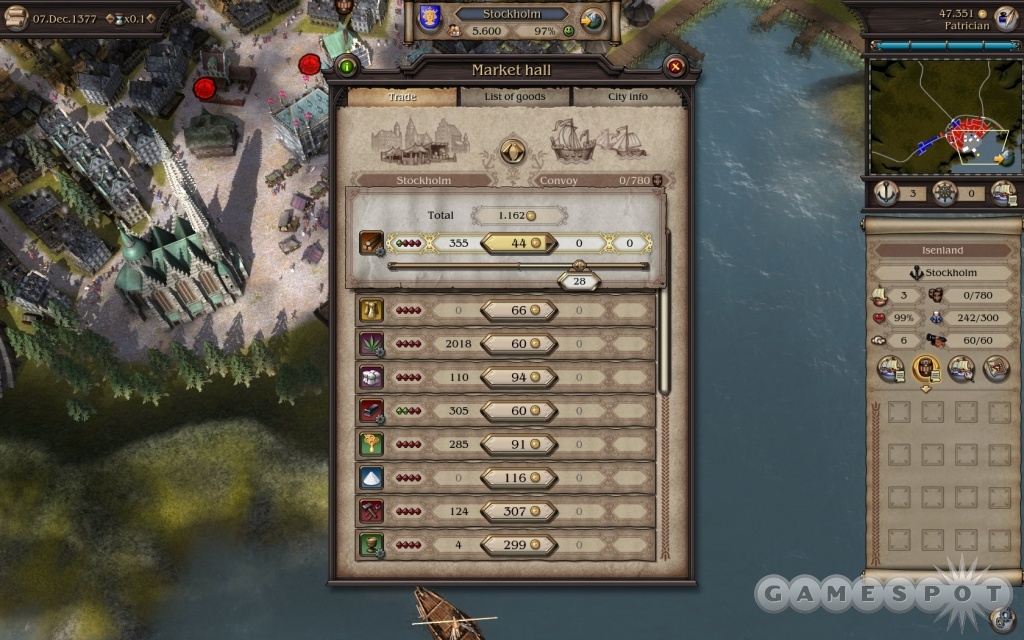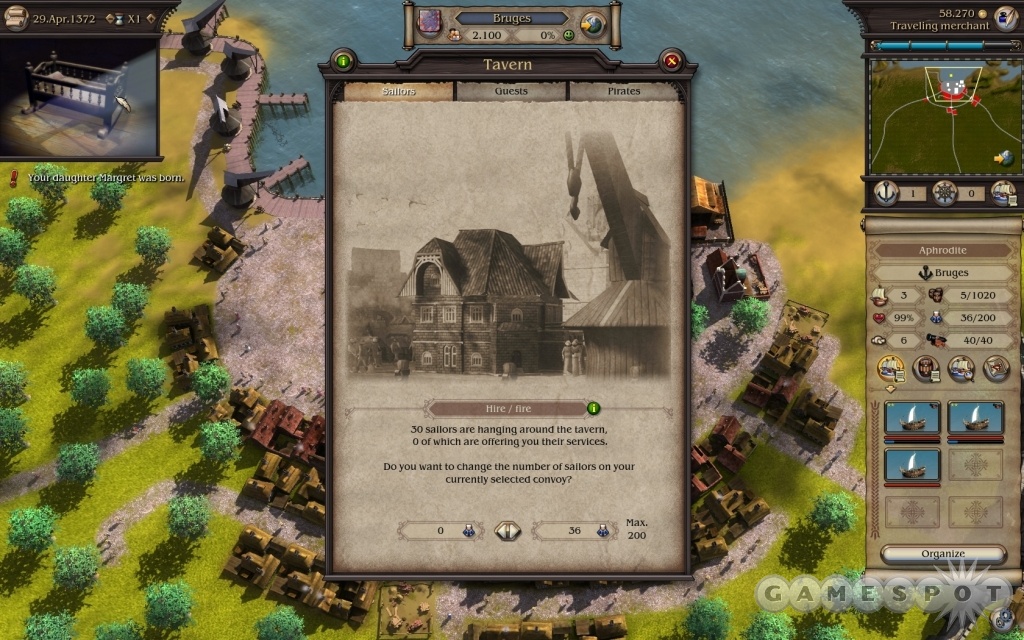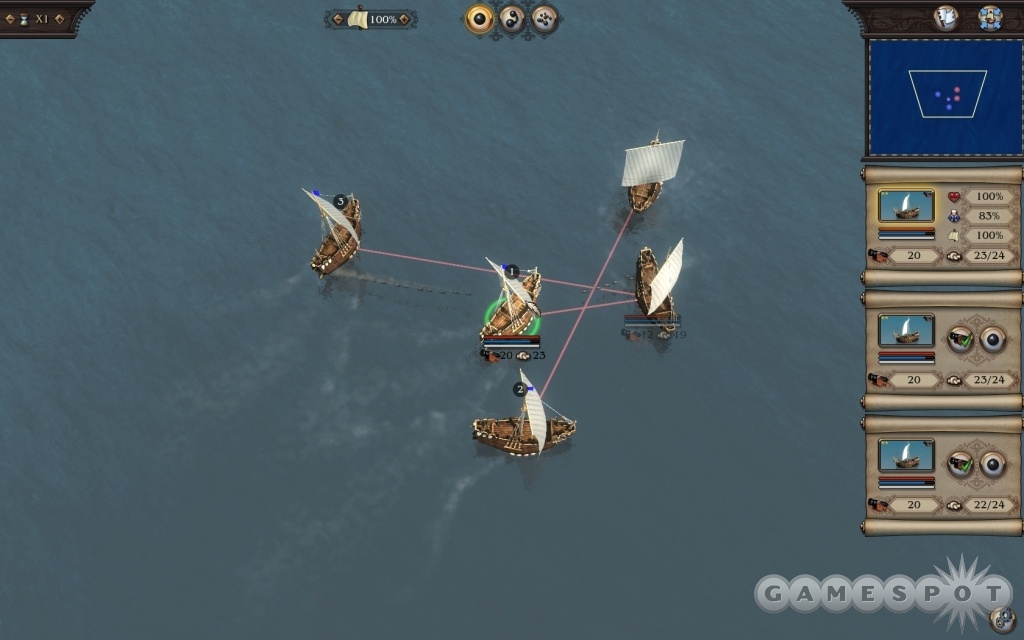In the Middle Ages, the worldly merchants of the Hanseatic League rejected both the drudgery of serfdom and the solitude of the cloister, instead embracing an enterprising life of supplying foreigners with cheap mead, dominating city politics, and, on occasion, hunting pirates. Somewhat independent from their nominal lords, the cities of the League and their merchants enriched themselves by ferrying cargo across the frigid waters of northern Europe. Hypothetically, the hijinks of a resourceful League merchant could inspire a game filled with high adventure and derring-do, but in reality, Patrician IV, the latest in a series of European trading simulators, represents a much more mundane version of medieval life, above all putting you through the monotonous daily grind required to keep cheese, meat, and mead flowing across the region.

In Patrician IV, you belong to a medieval European subculture in which crass materialism has triumphed over spirituality, and all the plagues and rat infestations that would be interpreted by contemporary society as manifestations of God's wrath are, to your character, merely business opportunities. Unfortunately, business is pretty dull, consisting mostly of buying cheap goods in one port, loading the goods onto your ship, sailing your ship to another port, and unloading the goods for a profit. Moving goods around is practically the only way your character can interact in this world, so it's unfortunate that trades are controlled exclusively by a finicky slider that makes it far too easy to accidentally buy up all of a town's meat, enraging its inhabitants, or sell off your precious pelts for less than what you bought them for.
In fact, nearly every problem in the world can be solved by moving goods to the right port or warehouse. A prince wants you to punish an uppity vassal? Just drag all of his meat and grain onto your convoys, and he'll starve. Like to improve your relations with a particular city? Drag and drop a heaping load of foreign goods onto its docks. Even courtship boils down to making sure you've stockpiled enough goods in your warehouse to pay for the wedding party. Of course, you could take a laissez-faire attitude toward the whole endeavor and just set up automated trade convoys, but then there will be precious little for you to do while waiting for profits to roll in. This isn't to say that there is no challenge to be had here. Patrician IV's economics can be surprisingly unforgiving; a few poorly planned purchases can be ruinous for your operation, making it relatively easy to dig yourself into an inescapable hole.
There are only two breaks from the tedium of burdening dockhands with load after load of wood, iron, meat, and so forth. The first respite, if you could call it that, is combat. The Baltic Sea is awash with pirates who menace local merchants, so you may find it appropriate to go blow some up from time to time. Once you've upgraded a fleet with a few cannons, hired sailors, and designated the ships as warships in the ship organization panel, you're finally ready to feed the scurvy dogs to the icy sea. Alas, after all that work, combat is anticlimactic. First, you don't feel like you have much control over the battle, because your sailors won't fire on your command. Instead, their rate of fire is apparently determined by the number of sailors in the fleet, so they fire pretty much whenever they get around to it. Second, they don't seem to care about their compatriots and will fire through their own ranks to hit the enemy. On the bright side, the ships are pleasing to the eye, like everything else in Patrician IV, and the sound is similarly well done. As well, combat does offer a few things for you to manipulate: you can order your men to select a different target, use a different type of shot, or maybe even fiddle with the sails, but at the end of the day, you're just watching little ships circle each other until one side dies.

Thankfully, the politics within the game offer a second, and more amusing, diversion. A popular and prestigious merchant has a good shot at being elected mayor of one of the League's many cities. A few visits to the local tavern will give you a chance to attack your most popular opponents whether through arson, character assassination, or stirring up dissent among their workers. If elected, you'll suddenly have more responsibilities; you can order the construction of city walls, infirmaries, and other vital pieces of infrastructure, as well as direct research at the local university. As mayor, you also have more reason to pay attention to relations with your lord, since the office entails a greater responsibility for satisfying the endless demands of your capricious feudal lieges. However, keeping them happy is incredibly difficult. You can bribe them from time to time to curry favor, but it won't last. Monarchs who were perfectly satisfied with you a month before will suddenly hate your guts for inexplicable reasons, even if you have been giving them regular tributes. As a result, you'll want to extend city walls and put up whatever defenses you can; you don't want the king's men burning down your precious breweries, after all.
If your ambitions go beyond living out your days as mayor of Mead Towne, then you'll want to turn your ambition to becoming alderman of the Hanseatic League. As alderman, you are the League's chief administrator, charged with determining how it addresses various issues. For example, when a notorious pirate harasses League merchants, you can put a bounty on his head and watch as the other merchants mobilize to eliminate this menace. If the market is flooded with cheap metal, you could offer an incentive for merchants to acquire and shut down a few mines in order to lower production. In addition, you can try to expand the League by assigning other merchants the task of convincing worthy cities to join. Unfortunately, doling out quests isn't as awesome as it sounds, because you are limited to weighing in on issues that the guild brings to your attention, rather than free to devise your own regional strategies and machinations. However, there is some satisfaction in working your way to the top and making others do your dirty work.
While things do get more amusing in the late game, you'll probably lose your enthusiasm en route. Although the merchants of the Hanseatic League have some degree of freedom, their existence is still defined by a rigid hierarchy, and if you want to get anywhere in this world, you have to continually amass more wealth, improve your standing in more cities, build counting houses, and expand your navy. As a result, prerequisites for missions become a major hassle at times. For example, Patrician IV will have you spend an hour carefully building up your rank so that you can embark on an expedition to Italy to buy spices, only to discover that you don't have the right ships in your fleet, and once that has been rectified, you learn that none of your ship captains are sufficiently experienced in navigation to make the trip. Why couldn't the guild tell you all of this when it sold you the rights to explore the Mediterranean?

A multiplayer mode could have been interesting, but it is not included with Patrician IV, so your only options are playing the campaign, which acts as a long tutorial, or jumping into the less rigidly structured free play mode. It is probably prudent to skip the campaign, unless you get really lost, and focus on free play, which is more fun than the campaign for two main reasons. The first is that some of the campaign triggers seem buggy, meaning that the game doesn't always register that you have accomplished something. The second reason is that free play lets you start with more cities on the map, which means that you can try to become mayor of Flensburg if the fine people of Hamburg run you out of town.
All in all, Patrician IV has some promise, but it goes too far in portraying the toil and the monotony that one can expect from real work. Although the game offers some unique fun with its mayoral politics and beyond, the busywork required to reach the good stuff and the lackluster combat hold it back. If you are a major fan of trading sims, then Patrician IV may be worth a look, but it isn't a title that will bring lots of new fans to the genre.